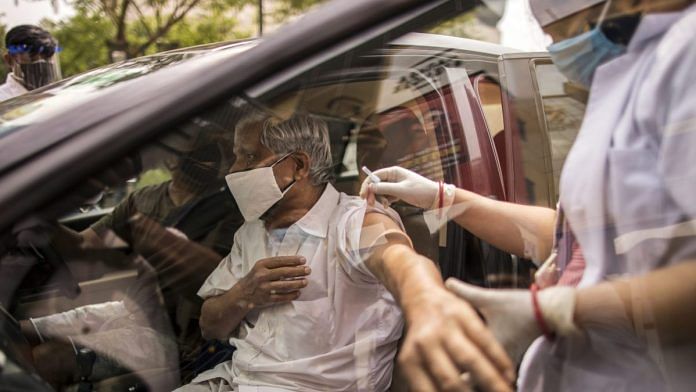New Delhi: Before Covid-19 vaccines were first approved for emergency use last year, the World Health Organization had published a report, in October 2020, suggesting ways to create enabling environments to encourage vaccination. Today, countries across the world have taken this a step further.
From cash prizes to free cows, unique incentives are being offered across the world to encourage people to get the shot.
In India, which continues to face a second wave of the virus coupled with a growing anti-vaxxer movement, the central government has offered a cash prize to people who submit photos of themselves getting vaccinated along with a tagline. The 10 best entries are awarded Rs. 5,000 every month till the end of 2021, says the government website.
“I’m not sure Rs 5,000 is enough. The number should ideally be high enough to compensate you for the perceived risk of the vaccine,” Karan Arora, founder of a Gurgaon-based behavioural economics start-up called BEAST, told ThePrint.
“Rather than awarding the 10 people Rs. 5,000, it would be better to just have one person standing a chance to win Rs 50,000,” Arora added.
In April, citizens communities in different states also started offering freebies. For example, a goldsmith community in Gujarat’s Rajkot offered a gold nose pin for women and a hand blender for men who take the shot at a camp set up by the community while a restaurant in Vizianagaram, Andhra Pradesh was handing out free biryani to those who had been inoculated.
Other countries have also opted for innovative ways to tackle vaccine hesitancy and ramp up inoculation drives. In the first two weeks of May, Dubai rewarded fully-vaccinated residents free access to gyms and fitness centres.
Meanwhile, in the US, fast-food companies and restaurants have offered people free food, beer and dessert upon providing proof of vaccination.
However, experts like academic and health care innovation expert David Asch have told the Association of American Medical Colleges that such offers are more “a marketing move more than anything else.”
Also read: Pfizer says its vaccine protects against B.1.617, the Covid variant first found in India
Cash rewards, lottery campaigns
On 5 May, Serbia became the first country to initiate a “cash-for-jabs scheme”, reported France24. President Alexander Vučić announced that anyone who gets vaccinated by 31 May would be paid 3,000 dinars (approximately Rs. 2,258), which is around 5 per cent of the average monthly salary.
Similarly, in the US, the state of Ohio announced Wednesday that residents who got at least one shot of a vaccine would be eligible to win a $1 million lottery. After the announcement, the average number of new vaccinations per day increased to 26,000, up from about 15,000. States like Colorado and Oregon have also offered similar jackpot campaigns.
However, cash incentives have been criticised as gimmicks or stunts. Behavioural economists have also pointed out that they could be counter productive.
Emily Largent, assistant professor of medical ethics and health policy at the University of Pennsylvania, told The Lancet journal, “There is good evidence from behavioural economics that offering money to someone to do something can make it seem like that thing is riskier or more burdensome.”
Others have suggested using the money on providing better ways of delivering vaccines to people such as mobile vaccination sites.
Also read: Moderna vaccine effective in 12-17 year-olds, could become 2nd shot approved for teens in US
College scholarship opportunities, free cows
A study published in the medical journal JAMA Network in December 2020, states that instead of monetary incentives “contingent nonfinancial incentives” are the desired approach.
A recent example is New York Governor Andrew Cuomo’s announcement Wednesday that any state resident between 12 to 17 years who gets a first dose would be entered into a raffle to win a scholarship to a public university. A district of northern Thailand also launched a raffle campaign for its vaccinated residents last week, except they stood a chance to win a live cow.
Meanwhile in Beijing, authorities have established a colour-coding system for buildings to incentivise businesses to fully vaccinate their staff.
Xu, a restaurant manager who was granted a green sign for inoculating his entire staff, was quoted by The Guardian as saying, “Customers feel safer to dine here, and we’re now really busy in the afternoon.”
This is part of China’s larger campaign, aimed to vaccinate 40 per cent of its population by June end, which also includes free eggs, store coupons and discounts on groceries to those who got the jab.
However, incentives have also backfired. Australian Health Minister Greg Hunt faced criticism for suggesting overseas travel could be used as an incentive to encourage Australians to accept a shot.
Since Australia has extended its international travel ban till 2022, other MPs fear the proposal could be “discriminatory” and “segregate Australians into haves and have nots”.
Also read: Cost of vaccination will hurt already creaking budgets of Indian states



